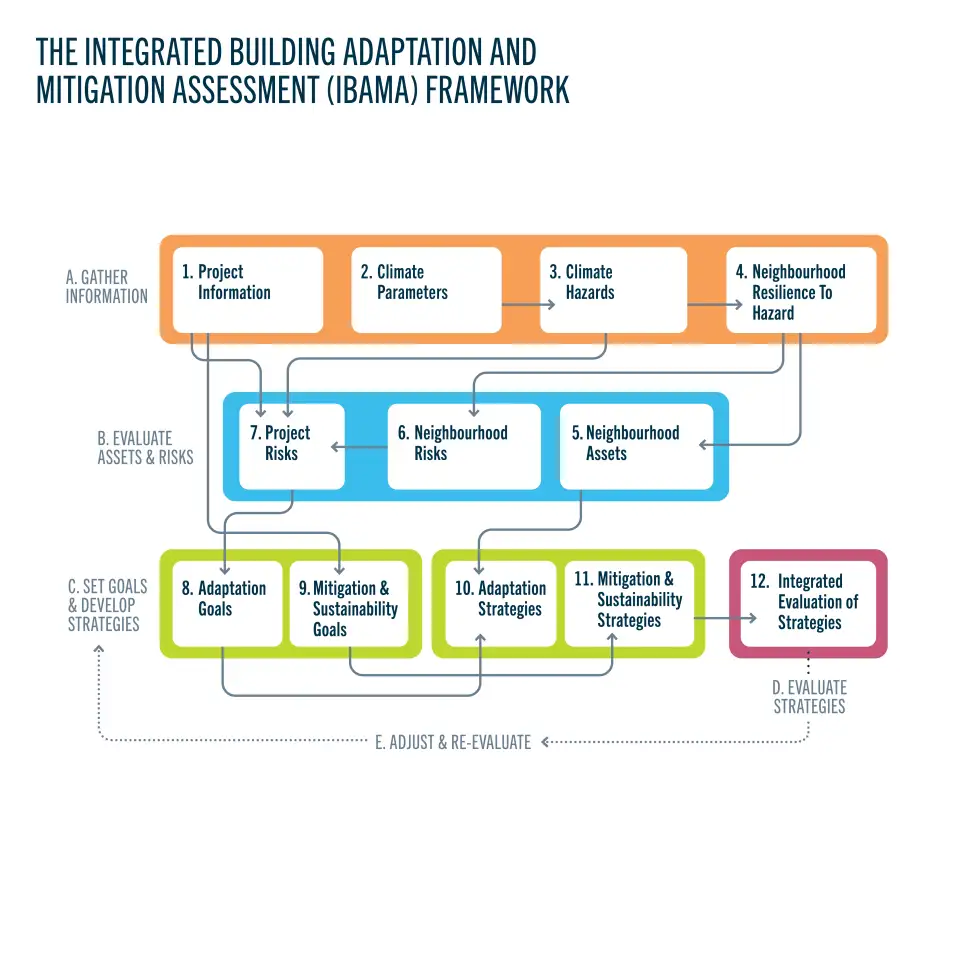
The release of the IPCC’s most recent report makes patently clear how critical it is to design buildings to minimize carbon emissions impact, if there had been any question. But, with the climate already changing, adaptation and resilience strategies have started garnering more attention. Enter Ilana Judah, principal of ACORN Resilience & Sustainability. Judah is the primary developer of the recently released Integrated Building Adaptation and Mitigation Assessment (IBAMA) framework, a tool for building owners and design professionals to integrate climate mitigation and adaptation considerations and identify synergies, trade-offs, and potential conflicts among various design solutions. IBAMA was conceived in partnership with BC Housing as part of its multi-year Mobilizing Building Adaptation and Resilience (MBAR) initiative.
The IBAMA framework is a process-based methodology that guides a user through an assessment of a building’s—and its neighborhood’s—potential resilience risks for establishing climate adaptation, mitigation, and sustainability goals and developing strategies to achieve those goals. “It is implemented by means of an introductory primer, a detailed guidelines document, and an associated spreadsheet tool,” says Judah. The spreadsheet tool tracks project data and generates comparative charts of hazards, risks, and strategies. In much the same way as an energy modeling tool best informs the design process when it is used starting at an early stage, IBAMA is meant to be a resource from pre-design all the way to occupancy.

Judah developed IBAMA as part of her Master’s thesis while at the Institute for Resources, Environment & Sustainability (IRES) at the University of British Columbia (UBC). BC Housing was a partner in the process, regularly providing feedback on the framework, both from its own organization’s perspective and also from its network of stakeholders. The Pacific Institute for Climate Solutions (PICS) provided funding and management support.
Before enrolling at UBC, Judah had been a principal and the director of sustainability at FxCollaborative in New York City. She left that architectural practice to broaden her horizons generally from her long-time focus on buildings and sustainability and in particular to better understand the complexities of climate change and resiliency responses. “As an architect, personally, there were limitations to what I knew and how I could make a broader environmental impact,” Judah acknowledges. The interdisciplinary nature of the IRES program was a huge asset in terms of accomplishing her objectives.
After completing her Master’s degree in December 2020, Judah has been working as a consultant with various clients, including assisting BC Housing to pilot the IBAMA framework on one of its projects that has ambitious sustainability goals. The Vienna House is a six-story affordable housing project primarily targeting families and seniors, currently in early design. The project is exploring Passive House certification and use of mass timber construction. Judah worked with the project team to identify major hazards and risks related to current and future climate scenarios, adaptation goals, and strategies related to those goals. Potential strategies discussed in the IBAMA workshops included green infrastructure to reduce overland flood risks, passive strategies such as cross ventilation and shading to minimize overheating risks, and a PV array with battery storage to ensure resilience during power outages. Though not a climate hazard, seismic resilience solutions were also investigated, many of which align with Passive House objectives.
The IBAMA Vienna House pilot enabled the project team to think more expansively about climate adaptation over the lifespan of the building and identify synergies with the project’s climate mitigation objectives. The process also facilitated a systems-thinking based approach that considered the neighborhood and infrastructure contexts, critical to advancing climate adaptation and resilience. BC Housing is continuing with the development and deployment of the IBAMA framework, recently engaging an IBAMA project lead from BC’s Ministry of Environment and Climate Change to pilot the methodology on other projects. “Through the piloting process, the framework will evolve,” notes Judah. She expects that the framework, which was originally developed for residential buildings, will be adapted for planning and designing other building types.
Feature image courtesy of GBL Architects, photo by Derek Lepper.